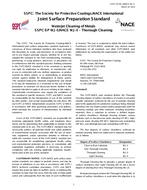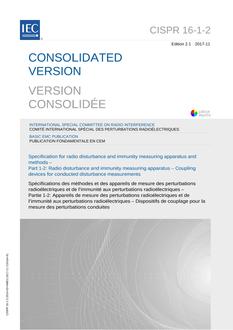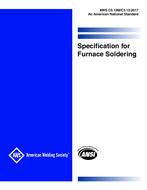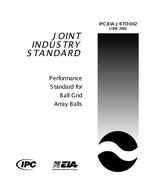
SSPC SP WJ-3/NACE WJ-3
Original price was: $40.00.$20.00Current price is: $20.00.
Thorough Waterjetting, Includes Editorial Revision (2017)
| Published by | Publication Date | Number of Pages |
| SSPC | 03/10/2012 | 9 |
SSPC SP WJ-3/NACE WJ-3 – Thorough Waterjetting, Includes Editorial Revision (2017)
Section 1: General
1.1 This standard defines the Thorough Cleaning (WJ-3) degree of surface cleanliness of uncoated or coated metallic substrates by use of waterjet cleaning. The defined degree of cleanliness shall be achieved prior to the application of a specified protective coating or lining system. These requirements include the end condition of the surface and materials and procedures necessary to achieve and verify the end condition, as determined by visual inspection. This standard also may be used in situations in which the degree of cleanliness is required, but protective coatings or linings are not immediately applied. (Paragraphs A1 and A2 of Appendix A provide additional information.) Waterjet cleaning does not establish but may reveal an existing surface profile on a metallic substrate. If the existing surface profile is not acceptable for subsequent coating application, alternative surface preparation methods to create the required surface profile must be considered. (Paragraph A3 of Appendix A provides additional information.)
1.1.1 Thorough Cleaning (WJ-3) is essentially equivalent to the International Organization for Standardization (ISO) 8501-4 degree of cleanliness Wa 2, thorough cleaning ISO 8501-4 notes the use of various common terms for methods of waterjet cleaning: water jetting, water blast cleaning, hydrojetting, aquajetting, hydroblasting, aquablasting, and “cleaning by directing a jet of pressurized water onto the surface to be cleaned.”
1.2 Although carbon steel is the metallic substrate most frequently cleaned in the field using waterjetting technology, waterjet cleaning may be used on metallic substrates other than carbon steel, including other ferrous substrates such as alloy steels, stainless steels, ductile iron and cast irons, nonferrous substrates such as aluminum, and copper alloys such as bronze. For convenience, the written definitions of the degrees of surface cleanliness of the metallic substrate use the general term “rust and other corrosion products.” The term “rust” is intended to apply to carbon steel substrates and the term “other corrosion products” (such as surface oxides) is intended to apply to metallic substrates other than carbon steel that are being waterjet cleaned. “Flash rust” is an oxidation product that forms as a wetted carbon steel substrate dries. The visual guides and comparators referenced for cleanliness and flash rust only illustrate carbon steel substrates.
1.3 This standard does not address surface preparation of concrete. Information on surface preparation of concrete can be found in SSPC-SP 13/NACE No. 6.
1.4 This standard is limited to requirements for visible surface contaminants. Information on nonvisible contamination can be found in Paragraph A8 of Appendix A.
Product Details
- Published:
- 03/10/2012
- Number of Pages:
- 9
- File Size:
- 1 file , 230 KB
- Note:
- This product is unavailable in Ukraine, Belarus, Russia



